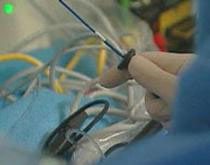This is the VOA Special English Health Report.
A condition called atrial fibrillation produces an abnormal heartbeat. People feel their heart race and they lose their breath. It may last a few seconds, but it can get worse and worse with age, leading to a heart attack or stroke.
Doctors generally treat atrial fibrillation with drugs. But a new study shows that another treatment may have better results for patients who were not helped by drug therapy.

The treatment is called catheter ablation. Doctors place a long thin tube called a catheter into the heart. Then they use radio frequency energy to heat the tissue around the catheter. The heat burns off a small amount of heart muscle. The goal is to block abnormal electrical activity in the heart.
Researchers studied more than 150 patients who had failed to respond to at least one drug in the past. In the study, about 100 of them had catheter ablation. The others were treated with more drugs. There was a nine-month follow-up period to compare the effectiveness.
Doctor David Wilber at Loyola University Medical Center in Illinois was the lead author of the study. He says catheter ablation worked in 60 to 70 percent of the patients. By comparison, abnormal heartbeats returned in 80 to 90 percent of those treated with drugs.
But Doctor Wilber says catheter ablation is not meant to be the first treatment choice for atrial fibrillation. He suggests it only when drug therapy fails to work. The study appeared in the Journal of the American Medical Association.

Doctors can also use catheters to open blocked arteries that supply blood to the heart. That happened last week with Bill Clinton. The former president had a procedure called an angioplasty. Doctors used a catheter and placed two mesh tubes, called stents, into a blocked artery to help keep it open.
Bill Clinton was taken to a New York hospital last Thursday and released the next day.
His heart doctor, Alan Schwartz, said the former president had been feeling pressure in his chest for several days.
ALAN SCHWARTZ: "He had been having episodes of chest discomfort that were brief in nature. But because they were repetitive, he contacted me and came in."
The American College of Cardiology says one in five patients who receive angioplasty has already had heart bypass surgery. That includes Bill Clinton. He had a major operation because of blockages in 2004. Doctors say it is common for heart patients to need new stents over time.
And that's the VOA Special English Health Report. I'm Bob Doughty.
atrial fibrillation: fibrillation of the muscles of the atria of the heart 心房纖維性顫動(dòng)
catheter ablation: an invasive procedure used to remove a faulty electrical pathway from the hearts of those who are prone to developing cardiac arrhythmias 心導(dǎo)管消融
catheter: a tube which is used to introduce liquids into a human body or to withdraw liquids from it 導(dǎo)管
angioplasty: an operation to repair a damaged blood vessel or unblock a coronary artery 血管修復(fù)術(shù)
stent: a slender tube inserted inside a tubular body part (as a blood vessel) to provide support during and after surgical anastomosis 血管內(nèi)支架
Needle injuries to medical students often go unreported
Two studies give a lift to running barefoot
Health: now, an update on those New Year's resolutions
(來(lái)源:VOA 編輯:陳丹妮)
